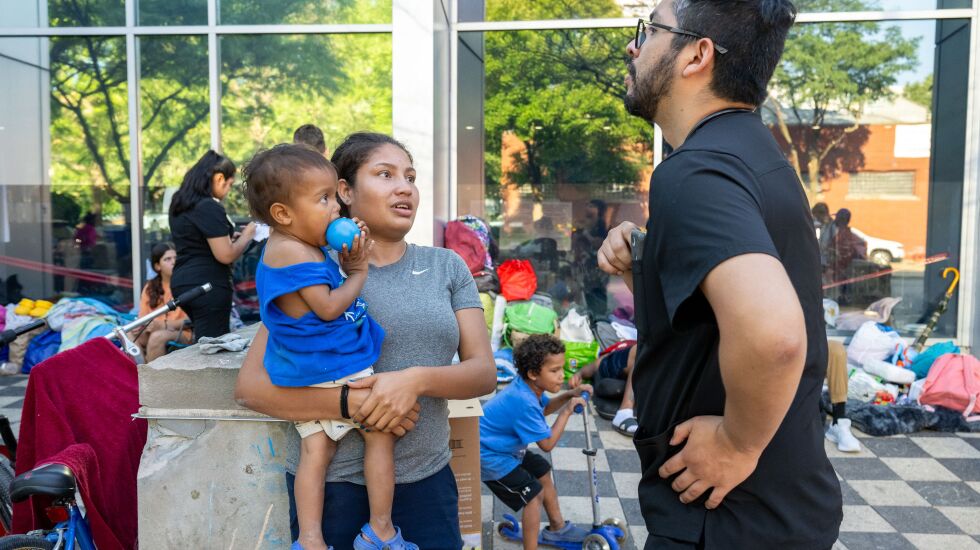
Javier Alexander Vega, the youngest in his family of recent immigrants, is big enough to walk. But, when he does, his legs look too thin to carry him.
Javier, who’s 11⁄2 years old, is malnourished. His first doctor’s visit in Chicago doesn’t start by saying “ah” but with a physician laying what looks like a silver dinner plate at his feet that turns out to be a scale.
The doctor has seen that hollow look before among other new arrivals to Chicago.
Malnourishment is one of many ailments immigrants are suffering from. Often, it would remain untreated if not for a group of volunteer medical students, doctors and other health care professionals known as Chicago’s Mobile Migrant Health Team.

More than 13,000 immigrants have arrived in Chicago since Texas Gov. Greg Abbott and other politicians elsewhere began shipping them by bus to Chicago and other Democrat-led cities at the end of August 2022. The city has established a network of shelters for the new arrivals, where they get help with housing and services including health care.
But the rate of arrivals has outpaced the city’s ability to open shelters, leaving many to sleep at Chicago Police Department stations since at least January. As of Wednesday, 1,246 immigrants were staying temporarily at police stations, according to the city’s Office of Emergency Management and Communications.
Many would be without health care if not for volunteers like the group who stopped by the Near South Station, where the Vega family has been staying on a recent evening.
“He couldn’t keep anything down,” said the boy’s father, Joseph Jovanne Vega, recounting the family’s three-month journey from South America to the United States. “He’s very underweight for his age.”
The stop at the police station is one of several the team will make during the week.
The team was started in early May by Sara Izquierdo, a Chicago native who previously worked on a team treating unhoused populations and led neighborhood COVID-19 vaccination drives.

At 27, Izquierdo is entering her second year of medical school. She created the team with a few other medical students from University of Illinois Chicago. It has grown to include 200 volunteers from medical schools, hospitals and clinics.
There are other volunteer groups offering medical care, too, but the Mobile Migrant Health Team is relied on by city officials.
When a 3-year-old died recently in downstate Illinois on a bus from Texas bound for Chicago, city officials asked the migrant health team to do assessments of the rest of the passengers aboard the bus.
The Texas Division of Emergency Management has said that immigrants boarding the buses from the state undergo a temperature check and are asked whether they have medical conditions that might require medical assistance.
The team goes out twice a week to police stations, usually with 10 volunteers for each run, always with at least one doctor, and see anywhere from just a few people to 30 or more.
“The impact of very long migratory journeys is that they make people worse for wear,” Izquierdo said.
Many have complications after having medications for chronic illnesses confiscated at the Texas border.
“It’s not just your ibuprofen that you were carrying; it’s diabetes medication, blood pressure,” said Dr. Elizabeth Payment, a family physician who has been volunteering since mid-May. “Some of these can have really lasting consequences with missed doses.”
The team has seen people with spiking blood pressure, asthma aggravated by wildfires and diabetes-related problems.
It provides free over-the-counter medications, covers the cost of prescriptions and will provide transportation when needed to emergency rooms and clinics.
The team is organized under the Pilsen Food Pantry nonprofit and is supported through donations to the pantry directly and to its GoFundMe page. Evelyn Figueroa, executive director of the pantry, estimates the group has spent $15,000 on medications.
“It’s a lot of resources being given out of the goodness of people’s hearts and with poor support from the city,” Payment said.

Before the medical team arrived at the Near South Side station, where the Vega family was also staying, Katy Pernett Perez cried at the thought of what might happen to her little boy. Josue Miguel, almost 1, had several small cuts from the journey, but one on his foot hadn’t been right since it got soaked crossing the Rio Grande. Since then, he has remained in Perez’s arms or on the family’s mattress.
“It hurts him to touch the floor,” said his father Miguel Ángel Llovera Planchart, “I think it got infected.”
The medical team provided medication to bring down the boy’s fever and fight infection.
“Yeah, he has a good spirit,” said Planchart, 34.
Michael Loria is a staff reporter for the Chicago Sun-Times via Report for America, a not-for-profit journalism program that aims to bolster the paper’s coverage of communities on the South Side and West Side.







